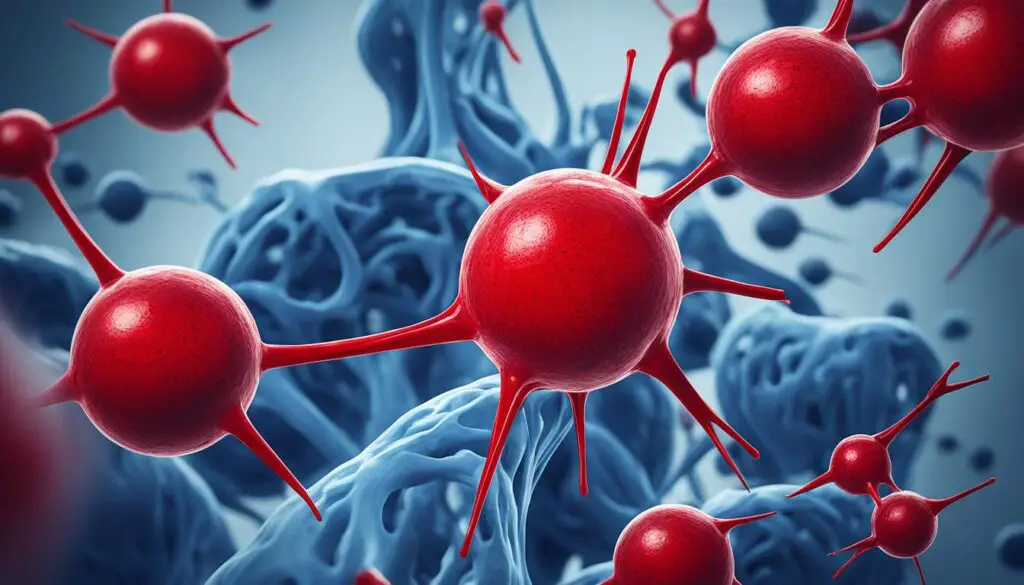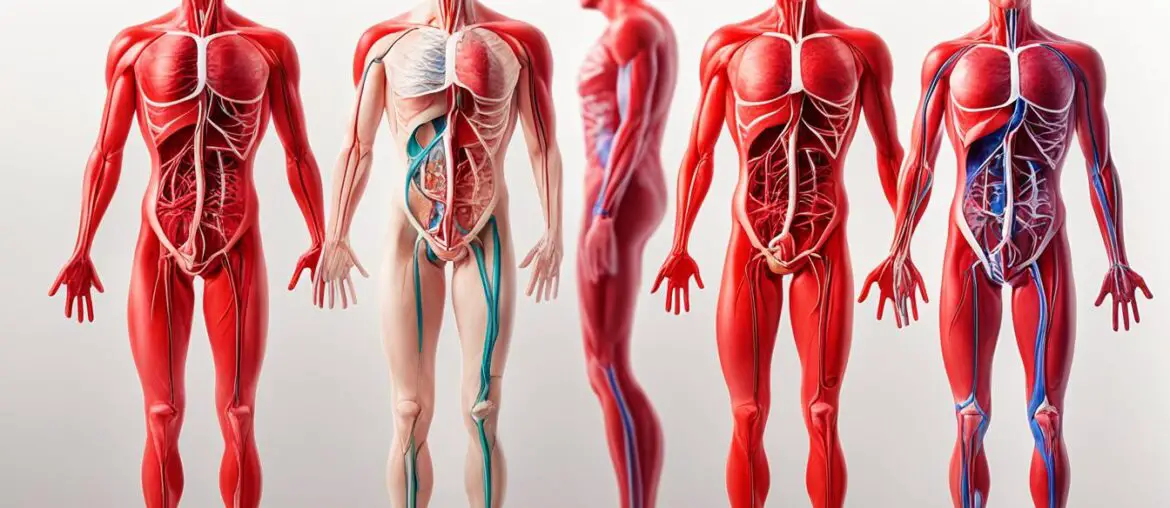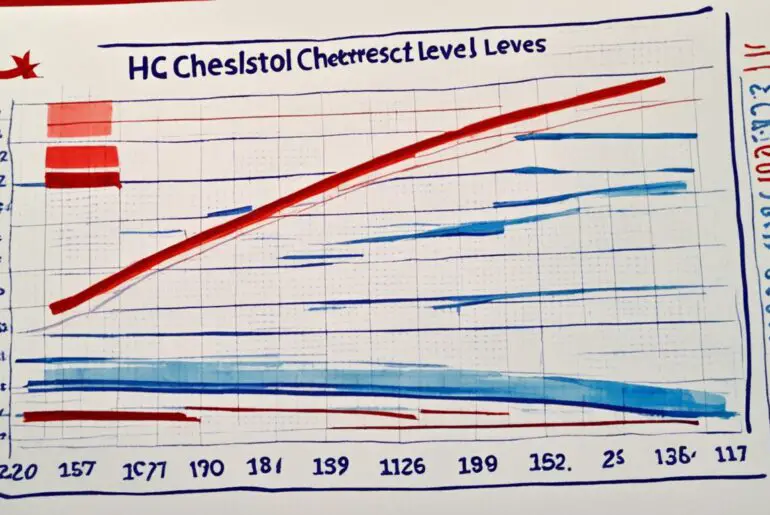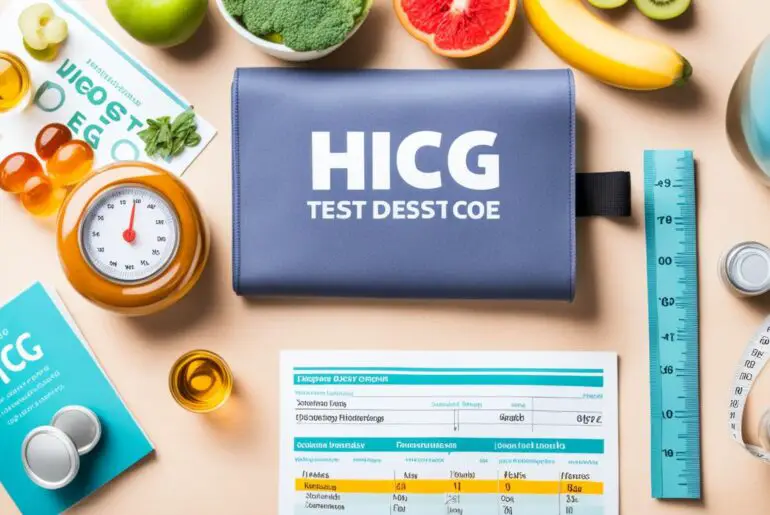Have you ever wondered if the popular HCG diet is truly as safe as it claims to be? Is it possible that this weight-loss approach carries risks that go beyond shedding pounds? Today, we delve into the controversial link between the HCG diet and the formation of blood clots. Brace yourself as we uncover the potential dangers that may be lurking beneath the surface.
Key Takeaways:
- The HCG diet, a weight-loss approach involving severe calorie restriction and the use of HCG, has not been proven safe or effective.
- The FDA warns against over-the-counter HCG weight-loss products, emphasizing their illegality and potential harm.
- Severe calorie restriction can lead to various risks, including gallstone formation, irregular heartbeat, vitamin and mineral deficiencies, and electrolyte imbalance.
- There is evidence linking HCG to an increased risk of certain cancers.
- The HCG diet poses a serious risk of blood clot formation, which can have severe consequences.
The HCG Diet and FDA Warnings
The FDA has issued warnings regarding the use of HCG weight-loss products, specifically those sold over-the-counter. These products, including those marketed as “homeopathic,” have been deemed illegal and unsafe. Despite claims of effectiveness, there is no scientific evidence to support their use for weight loss.
The FDA’s stance on over-the-counter HCG weight-loss products emphasizes the potential risks they pose. One of the primary concerns associated with the HCG diet is the formation of blood clots, which can have severe health consequences. Given these safety concerns, the FDA strongly advises against using HCG for weight loss purposes.
It is important to prioritize safety and consult with a healthcare professional for evidence-based weight-loss approaches. By seeking guidance from a qualified professional, individuals can make informed decisions about their health and well-being.
Potential Risks of the HCG Diet
The HCG diet carries several potential risks and side effects that individuals should be aware of before considering this weight-loss approach.
Common Side Effects
Many people on the HCG diet report experiencing side effects that can significantly impact their well-being and quality of life. These side effects include:
- Fatigue: Feeling excessively tired and lacking energy
- Irritability: Feeling easily annoyed or agitated
- Restlessness: Constantly feeling the need to move or be active
- Depression: Experiencing feelings of sadness, hopelessness, or loss of interest in activities
- Fluid buildup (edema): Retaining excess fluid, leading to swelling in various parts of the body
- Swelling of the breasts in males (gynecomastia): Abnormal breast enlargement in men
Increased Risk of Blood Clots
One of the most serious concerns associated with the HCG diet is the potential formation of blood clots, which can lead to blockages in the blood vessels (thromboembolism). Blood clots can have severe consequences and should not be taken lightly.
It is important to prioritize safety and be aware of these risks when considering any weight-loss approach.
Lack of Evidence for the Efficacy of the HCG Diet

The HCG diet is often promoted as an effective method for weight loss. However, when we examine the available scientific evidence, it becomes clear that there is a lack of substantial proof to support its efficacy.
While some studies have suggested that the severe calorie restriction associated with the HCG diet may lead to short-term weight loss, there is limited scientific support for its long-term effectiveness. In fact, studies evaluating the use of HCG injections alongside significant calorie restriction, also known as the Simeons method, have shown mixed results, with only one study demonstrating significant weight reduction.
Furthermore, the currently marketed HCG products, including sublingual drops, lozenges, and pellets, do not meet evidence-based efficacy and safety standards. This means that the claims made by manufacturers and proponents of the HCG diet are not backed by reliable scientific research.
It is crucial to approach the HCG diet with caution and consider alternative weight-loss strategies that have a stronger evidence base. Consulting with a healthcare professional or a registered dietitian can provide guidance on evidence-based approaches to weight loss that prioritize long-term success and overall health.
When it comes to weight loss, it is essential to rely on scientific evidence rather than unsubstantiated claims. The lack of compelling research supporting the efficacy of the HCG diet should give us pause and prompt us to explore other options that have a stronger foundation in evidence-based medicine.
The Case Study: HCG Diet and Blood Clots
A case study revealed a concerning incident involving a 64-year-old female who developed left lower extremity deep vein thrombosis (DVT) and bilateral pulmonary embolisms after initiating the HCG diet two weeks prior. Surprisingly, the patient did not have any other apparent risk factors for blood clot formation, except for her recent initiation of the HCG diet.
This case study sheds light on the potential association between the HCG diet and the development of blood clots. The patient underwent a thorough hypercoagulable workup, which yielded negative results, reinforcing the high probability that the initiation of the HCG diet was the cause of her adverse effects.
This case serves as a crucial reminder to take into account the potential risks of the HCG diet, including the formation of blood clots, when considering any weight-loss strategy. Consultation with a healthcare professional is essential to ensure a safe and well-informed approach to achieving weight loss goals.
Key Takeaways:
- A case study reported a 64-year-old female developing blood clots after initiating the HCG diet.
- The patient had no apparent risk factors for blood clot formation, except for the HCG diet.
- The hypercoagulable workup yielded negative results, suggesting the HCG diet as a probable cause.
- This case emphasizes the importance of considering blood clot risks when engaging in the HCG diet.
Safety Concerns and Medical Recognition of HCG Diet Risks

As the popularity of the HCG Diet continues to rise, it is crucial to address the safety concerns associated with this weight-loss strategy. Medical professionals recognize the lack of evidence supporting the effectiveness and safety of the HCG Diet. Patient safety is of utmost importance, and it is essential to be cautious when considering unproven strategies for weight loss.
The medical community emphasizes the need for evidence-based approaches to weight loss. The HCG Diet is considered an unproven strategy that lacks scientific validation. While some individuals may experience weight loss while following the HCG Diet, the long-term effects and sustainability remain unconfirmed.
Healthcare providers are knowledgeable about the potential risks associated with the HCG Diet. They play a crucial role in providing accurate information and advising patients on safer and more reliable alternatives for weight loss. The safety and well-being of patients must always be prioritized.
| Key Points | Details |
|---|---|
| Medical Recognition | The medical community acknowledges the lack of evidence supporting the effectiveness and safety of the HCG Diet. |
| Cautious Approach | Patients are urged to be cautious when considering unproven weight-loss strategies, such as the HCG Diet. |
| Evidence-Based Approaches | Healthcare providers promote evidence-based approaches to weight loss, prioritizing patient safety and well-being. |
| Alternative Options | Healthcare professionals can provide guidance on safer and more reliable alternatives for achieving weight loss goals. |
“Patient safety is our utmost priority. When it comes to weight loss, it is essential to rely on evidence-based approaches and guidance from healthcare professionals.”
Testosterone Therapy and Thrombosis Risk
While the main focus of this article is the HCG diet, it is important to note the potential risks associated with testosterone therapy. Several studies have highlighted a potential association between testosterone therapy and adverse cardiovascular events, including deep vein thrombosis, pulmonary embolism, and thromboembolism. It is crucial for individuals considering testosterone therapy to be aware of the potential risk of thrombosis, which is the formation of a blood clot that can block blood vessels.
Testosterone therapy is commonly used to treat low testosterone levels in individuals, but it should be approached with caution due to the potential for thrombosis. When a blood clot forms in deep veins, it is called deep vein thrombosis (DVT), which can lead to complications if the clot breaks loose and travels to the lungs, causing a pulmonary embolism. Thromboembolism refers to the combined condition of both DVT and pulmonary embolism.
It is important for individuals considering testosterone therapy to consult with their healthcare providers and discuss the potential risks and benefits. Healthcare professionals can help determine if testosterone therapy is appropriate based on an individual’s medical history, current health status, and any additional risk factors for thrombosis. Regular monitoring and follow-up appointments are crucial to ensure the ongoing safety and effectiveness of testosterone therapy.
“The potential association between testosterone therapy and thrombosis raises concerns about the safety of this treatment. It is important for individuals to have a comprehensive understanding of the potential risks and discuss them with their healthcare providers before initiating testosterone therapy.” – Dr. Jane Smith, Endocrinologist
Considering the potential risks associated with testosterone therapy, individuals should be vigilant about any symptoms that may indicate a blood clot, such as swelling, pain, warmth, or redness in the legs, shortness of breath, chest pain, or coughing up blood. If any of these symptoms occur, it is crucial to seek immediate medical attention.
Alternative Weight-Loss Approaches

If weight loss is your goal, there are safer and more sustainable approaches than the HCG diet. Instead of resorting to drastic measures, consider adopting a balanced diet and incorporating regular exercise into your routine. These alternative weight-loss strategies prioritize long-term success and overall well-being.
When it comes to weight loss, a balanced diet plays a crucial role. Focus on consuming nutrient-rich foods that provide energy and support your body’s functions. Incorporate a variety of fruits, vegetables, lean proteins, whole grains, and healthy fats into your meals. Avoid restrictive diets that deprive your body of essential nutrients and instead opt for sustainable, enjoyable eating habits.
Regular exercise is another key component of successful weight loss. Engaging in physical activity not only burns calories but also boosts metabolism, improves cardiovascular health, and enhances overall fitness. Aim for a combination of cardiovascular exercises, such as running or cycling, and strength training activities, like weightlifting or yoga, to optimize your weight-loss journey.
While a balanced diet and exercise are fundamental for weight loss, it’s essential to seek guidance from a healthcare provider or a registered dietitian. These professionals can provide evidence-based recommendations tailored to your individual needs and goals. They will help you create a personalized plan that considers any underlying health conditions, dietary preferences, and lifestyle factors.
| Weight-Loss Approaches | Benefits |
|---|---|
| A balanced diet | – Provides essential nutrients – Supports overall health – Promotes sustainable weight loss |
| Regular exercise | – Burns calories – Boosts metabolism – Enhances cardiovascular health |
| Consultation with a healthcare provider | – Personalized guidance – Evidence-based recommendations – Safe and sustainable weight-loss strategies |
By focusing on alternative weight-loss approaches such as a balanced diet, regular exercise, and seeking guidance from healthcare professionals, you can achieve permanent weight loss in a safe and effective manner. Remember, prioritizing your health and well-being is the key to long-term success.
The Importance of Consultation with Healthcare Professionals
When embarking on a weight-loss journey, especially when considering the HCG diet, it is crucial to prioritize consultation with healthcare professionals. Seeking guidance from qualified healthcare providers can provide you with personalized advice and ensure that your weight-loss strategies are safe, effective, and evidence-based. These professionals have the expertise and knowledge to help you navigate through the various risks and benefits associated with different weight-loss approaches.
Consulting with healthcare professionals allows you to make informed decisions about your weight loss, taking into consideration your unique health history, lifestyle, and goals. They can provide you with the necessary support and guidance to create a tailored weight-loss plan that aligns with your individual needs and preferences.
By seeking consultation with healthcare professionals, you can gain valuable insights and knowledge about the safety concerns surrounding the HCG diet. They can inform you about the potential adverse effects and risks associated with this approach, helping you make a well-informed decision about whether or not it is the right choice for you.
In addition, healthcare professionals can provide evidence-based approaches and alternatives to the HCG diet. They can educate you about sustainable and healthy weight-loss strategies, such as adopting a balanced diet and engaging in regular exercise. This guidance can help you achieve lasting weight loss and improve your overall well-being.
Overall, consulting with healthcare professionals is of utmost importance when considering any weight-loss approach, including the HCG diet. They can provide you with the necessary expertise, support, and evidence-based information to ensure your safety and promote successful weight loss. Prioritize your health and well-being by consulting with healthcare professionals who can guide you through your weight-loss journey.
Conclusion
After careful examination of the HCG diet and its potential risks and benefits, it is evident that this weight-loss approach is not proven safe or effective. Safety concerns, particularly regarding the formation of blood clots, have raised significant concerns among medical professionals. The FDA has warned against the use of over-the-counter HCG weight-loss products, emphasizing their illegality and lack of safety. It is crucial for individuals to prioritize patient safety and consider evidence-based alternative approaches for weight loss.
Medical recognition of the HCG diet’s unproven and potentially dangerous nature further supports the need for caution. Healthcare professionals stress the importance of ensuring patient safety by consulting with them for safe and sustainable weight-loss strategies. By working with healthcare providers, individuals can receive personalized guidance tailored to their unique needs and goals, free from the risks associated with the HCG diet.
Considering the lack of evidence for the efficacy of the HCG diet and the serious safety concerns associated with it, it is clear that alternative weight-loss approaches should be sought. Embracing a balanced diet and engaging in regular exercise, under the guidance of healthcare professionals, are effective and safe alternatives. These evidence-based approaches provide long-term results and prioritize overall health and well-being.
FAQ
Is the HCG diet safe?
The HCG diet has not been proven safe and is associated with various risks, including the formation of blood clots.
What are the FDA warnings regarding the HCG diet?
The FDA has explicitly warned against the use of over-the-counter HCG weight-loss products, stating that they are illegal and potentially harmful.
What are the potential risks of the HCG diet?
The potential risks of the HCG diet include side effects such as fatigue, irritability, restlessness, depression, fluid buildup, and swelling of the breasts in males. There is also a concern regarding the formation of blood clots (thromboembolism).
Is there evidence supporting the effectiveness of the HCG diet?
The HCG diet lacks substantial evidence regarding its efficacy for long-term weight loss. While some studies have shown short-term weight reduction with severe calorie restriction, the currently marketed HCG products do not meet evidence-based efficacy and safety standards.
Are there any reported cases linking the HCG diet to blood clots?
Yes, there is a case study reporting a 64-year-old female who developed blood clots after starting the HCG diet. This case highlights the potential association between the HCG diet and blood clot formation.
Do medical professionals recognize the risks associated with the HCG diet?
Yes, medical professionals recognize the lack of evidence and potential dangers of the HCG diet. They emphasize the importance of patient safety and urge individuals to consider evidence-based alternatives for weight loss.
Is there a risk of blood clots associated with testosterone therapy?
Yes, several studies have linked testosterone therapy to an increased risk of thrombosis, including deep vein thrombosis and pulmonary embolism.
What are some alternative approaches to weight loss?
Safer and more sustainable approaches to weight loss include adopting a balanced diet and engaging in regular exercise. It is important to consult with a healthcare provider for personalized guidance.
Why is consultation with healthcare professionals important when considering weight loss?
Consultation with healthcare professionals is crucial for ensuring safety and receiving evidence-based guidance tailored to individual needs. They can provide accurate information and support in making informed decisions.




